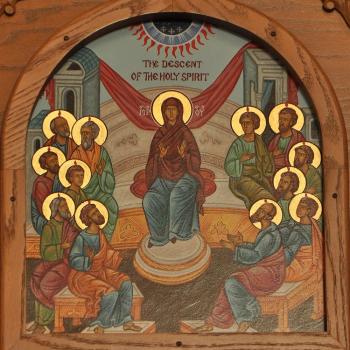
When Jesus sent his followers out to baptize the world in the name of the Father, Son, and Holy Spirit, the purpose was to unite the world with his baptism in the Jordan. For it is in the Jordan, in his baptism, that the Trinity was revealed, and so every Christian baptism represents this by having everyone baptized in the name of the Father, Son and Holy Spirit. Thus, the Venerable Bede preached:
The Son of God is baptized in a human being; the Spirit of God descends in the dove; God the Father is present in the voice – the mystery of the holy and indivisible Trinity is declared in the baptism. And it is right that he who was to command the stewards of his sacraments to teach all nations, and to baptize them in the name of the Father and the Son and the Holy Spirit, would first himself reveal the whole Trinity was personally present in his [own] baptism. [1]
It is vital for us to realize that when Jesus was baptized, it was an event, not only of Jesus (or God the Son), but of the Father, Son and Holy Spirit, because then we truly understand why Christian baptism must also be Trinitarian. For every baptism puts us into Christ, connects us to his baptism, and allows us to experience the descent of the Spirit upon us and the awareness that we have become children of God in Christ:
Then Jesus came from Galilee to the Jordan to John, to be baptized by him. John would have prevented him, saying, “I need to be baptized by you, and do you come to me?” But Jesus answered him, “Let it be so now; for thus it is fitting for us to fulfil all righteousness.” Then he consented. And when Jesus was baptized, he went up immediately from the water, and behold, the heavens were opened and he saw the Spirit of God descending like a dove, and alighting on him; and lo, a voice from heaven, saying, “This is my beloved Son, with whom I am well pleased” (Mat. 3:13-17 RSV).
The difference between Jesus’ baptism and ours is that his brought the Spirit to the water so that it can be the normative vessel of his cleansing grace, while ours brings us to the water in order to receive the grace of the Spirit which had been rendered to it by Jesus’ baptism. As God, Jesus acts according to his own divine freedom. Nothing is forced upon him. What he does is out of his all-compassionate love for his creation. He saw baptism was a way in which he spread his deifying grace to the world, and that he being baptized himself, he could lead us by example to accept baptism for ourselves. This is why he felt it was fitting to be baptized by John. Likewise, he saw that he could use baptism as a means of illuminating us as to who he is, that is through baptism, we can be awakened to the reality of the Trinity even as we then find the Trinity at work with us and in us thanks to our own baptism. Finally, he went to John, the teacher of repentance, so that we can realize that our baptism itself expects us to repent of our sins so that we can partake of the glory of the kingdom of God.
For the grace of God has appeared for the salvation of all men, training us to renounce irreligion and worldly passions, and to live sober, upright, and godly lives in this world, awaiting our blessed hope, the appearing of the glory of our great God and Savior Jesus Christ, who gave himself for us to redeem us from all iniquity and to purify for himself a people of his own who are zealous for good deed (Tit. 2:11-14 RSV).
In Jesus’ baptism, the grace of God was revealed to the world. And Jesus would like us to be baptized, to share the transmission of grace, and then be illumined by the revelation of the Trinity. Therefore:
… when the goodness and loving kindness of God our Savior appeared, he saved us, not because of deeds done by us in righteousness, but in virtue of his own mercy, by the washing of regeneration and renewal in the Holy Spirit, which he poured out upon us richly through Jesus Christ our Savior, so that we might be justified by his grace and become heirs in hope of eternal life (Ti. 3:4-7 RSV).
In Jesus’ baptism, the world is enlightened. St. John the Baptist was given a glimpse of that truth; this is why Scripture says he saw the descent of the Spirit like a dove and heard the voice of the Father. God didn’t have to reveal himself and offer grace in this manner, but because, in his wisdom, he thought it best, because it would help us in our faith, he allowed himself to be revealed in this manner:
Now it would not have been necessary for these things to happen except for the sake of our belief; the Father and the Spirit, as God unseen, could have come down upon the Word, the Son, by an unseen descent. For the sake of our faith, then, when heaven was opened, the Spirit came down to Christ, the Father to the Son, a voice to the Word. [2]
It is for us, not himself, that Jesus entered the water and had himself baptized. It was not for the sake of God, but for us, that God revealed himself at Christ’s baptism. God shared himself with the water, making it a vessel not only for the cleansing of filth from the material world, but also a means by which the pollution of sin could be washed away. Thus, St. Gregory Palamas explained:
Water is a means of cleansing, but not for souls. It can remove dirt from those being baptized, but not the grime that comes from sin. For that reason the Healer of souls, the Father of spirits (Heb. 12:9), Christ, who takes away the sin of the world (John 1:29) enters the water before us to be baptized, as we celebrate today in advance. He draws the grace of the all-holy Spirit from above to dwell in the water with Him, so that later when those being baptized as He was enter the water, He is there, clothing them ineffably with His Spirit, attaching Himself to them, and filling them with the grace that purifies and illumines reasonable spirits.[3]
Without the descent of the Spirit, the water would have remained as it was, but with the Spirit, it became the vessel of God’s grace. God works with symbols to help us realize the reality beyond the symbols. Because water cleanses us from physical stains, the fittingness of the use of water for baptism is relatively clear, for it helps us realize God is cleansing our souls from the defilement of sin similar to the way the body is cleaned by water from the defilement of dirt.
In Jesus’ baptism, the Spirit descended upon the water so that water can be used for our spiritual transformation. But this should show us that Jesus’ baptism did not only affect us, but rather, it affected the whole of creation, starting with the water in which he was baptized. Water becomes sanctified and then is able to share with other things the grace which it received. This is why holy water is used to bless things in the world. The sanctified water participates in its eternal, spiritualized form, and yet its historical, ordinary form remains, so that most will not be able to recognize the transformation which it received from the Spirit. It is elevated, and all that touches it receives a share in the Spirit, but only those who have been given the spiritual sight needed to see this will realize that truth; without that insight, sanctified things will appear as ordinary and their eschatological character will not be known. It is only the mystic, the one in tune with the eschatological grace which has been immanentized in creation by the incarnation, who truly perceive the spiritualization of the water and the world with it. Meister Eckhart, recognizing this, said:
No one can receive the Holy Spirit unless he lives above time in eternity. In temporal things the Holy Spirit can neither be received nor given. When a person turns away from temporal things and turns within himself, he becomes aware of a heavenly light that has come from heaven. It is under heaven yet it is from heaven. In this light a person has his fill, and yet it is corporeal; they say it is material. [4]
All those who receive the Holy Spirit have been elevated by the Spirit and partake of the eschaton, and through the eschaton, eternity. This is true for all who receive grace. But, for many, indeed, for most of us, this is the elevation of our potential; what is necessary for us is to realize what we have receive, to activate our potential and to make it real. We should orient ourselves in our thoughts and deeds towards eternity, and through eternity, we can then truly partake of temporal being without being limited by it. We are to be like Christ, able to experience eternity while engaging temporal existence, transforming all things through our eschatological awareness. The eschaton is to be immanent in us, for the eschaton has been immanentized in Christ. But without the purification of sin, this is not possible, and so the immanentization of grace requires the purification of nature, the purification of all those contaminated by sin.
And thus, in Christian baptism, there is a repetition of what happened to Jesus in his baptism, that is, there is a revelation of the Trinity:
For in holy baptism Heaven opens and that Blessed Trinity appears to the baptized, so that the faithful person may receive the knowledge of how to worship the One God in the true Trinity, Which truly appeared in the first sacrament of baptism.[5]
This revelation is found, not only in the words used for baptism, but also in the effects of baptism itself. The Spirit descends into the water, revealing its grace, sanctifying both the water and the one who is baptized. Then, the one who is baptized finds themselves joined to Christ; they find themselves one with him,as they are baptized into his death and resurrection. B
This is our present Festival; it is this which we are celebrating today, the Coming of God to Man, that we might go forth, or rather (for this is the more proper expression) that we might go back to God — that putting off the old man, we might put on the New; and that as we died in Adam, so we might live in Christ, being born with Christ and crucified with Him and buried with Him and rising with Him.[6]
By joining themselves to Christ, by becoming a part of the mystical body of Christ, the Spirit is able to dwell with them, for it is the Spirit of Christ. Then, as they find themselves one with the Son, as adopted children of God by their unity with Jesus, they truly come to know the Father as Father. For the Spirit and the Son lead them together to the Father, who takes them on as his heirs.
The baptism of Jesus, therefore, is not for him, but for us. It is one of the many ways Christ connects heaven with the earth (and, indeed, with all creation), so that all creation can come together in him and find itself elevated to heaven. The baptism of Christ is a universal event even as it is a historical and particular event. For it is in and through the particular event, in Jesus’s baptism, all can join themselves to him and be brought over to the Father, allowing for God to be all in all.
[1] Venerable Bede, Homilies on the Gospels. Book One. Advent to Lent. Trans. Lawrence T. Martin and David Hurst, OSB (Kalamazoo, MI: Cistercian Publications, 1991), 118.
[2] St. Maximus of Turin, The Sermons of St. Maximus of Turin. Trans. Boniface Ramsey, OP (New York: Newman Press, 1989), 158. (Sermon 64).
[3] St. Gregory Palamas, The Homilies. Trans. Christopher Veniamin et. al. (Waymart, PA: Mount Thabor Publishing, 2009), 487 [Homily 59].
[4] Meister Eckhart, “Sermon 29” in Meister Eckhart: Teacher and Preacher. Ed. Bernard McGinn, Frank Tobin and Elvira Borgstadt (New York: Paulist Press, 1986). 287.
[5] St. Hildegard of Bingen, Scivias. Trans. Columba Hart and Jane Bishop (New York: Paulist Press, 1990), 174.
[6] St. Gregory Nazianzus, “Oration XXXVIII: On the Theophany” in NPNF2(7):345-6.
Stay in touch! Like A Little Bit of Nothing on Facebook.
If you liked what you read, please consider sharing it with your friends and family!













